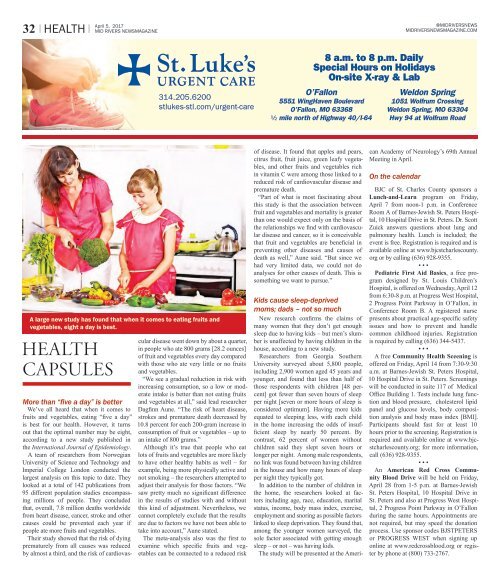Mid Rivers Newsmagazine 4-5-17
Local news, local politics and community events for St. Charles County Missouri.
Local news, local politics and community events for St. Charles County Missouri.
Create successful ePaper yourself
Turn your PDF publications into a flip-book with our unique Google optimized e-Paper software.
32 I HEALTH I<br />
April 5, 20<strong>17</strong><br />
MID RIVERS NEWSMAGAZINE<br />
@MIDRIVERSNEWS<br />
MIDRIVERSNEWSMAGAZINE.COM<br />
3-3459<br />
314.205.6200<br />
stlukes-stl.com/urgent-care<br />
8 a.m. to 8 p.m. Daily<br />
Special Hours on Holidays<br />
On-site X-ray & Lab<br />
O’Fallon<br />
5551 WingHaven Boulevard<br />
O’Fallon, MO 63368<br />
½ mile north of Highway 40/I-64<br />
Weldon Spring<br />
1051 Wolfrum Crossing<br />
Weldon Spring, MO 63304<br />
Hwy 94 at Wolfrum Road<br />
A large new study has found that when it comes to eating fruits and<br />
vegetables, eight a day is best.<br />
health<br />
capsules<br />
More than “five a day” is better<br />
We’ve all heard that when it comes to<br />
fruits and vegetables, eating “five a day”<br />
is best for our health. However, it turns<br />
out that the optimal number may be eight,<br />
according to a new study published in<br />
the International Journal of Epidemiology.<br />
A team of researchers from Norwegian<br />
University of Science and Technology and<br />
Imperial College London conducted the<br />
largest analysis on this topic to date. They<br />
looked at a total of 142 publications from<br />
95 different population studies encompassing<br />
millions of people. They concluded<br />
that, overall, 7.8 million deaths worldwide<br />
from heart disease, cancer, stroke and other<br />
causes could be prevented each year if<br />
people ate more fruits and vegetables.<br />
Their study showed that the risk of dying<br />
prematurely from all causes was reduced<br />
by almost a third, and the risk of cardiovascular<br />
disease went down by about a quarter,<br />
in people who ate 800 grams [28.2 ounces]<br />
of fruit and vegetables every day compared<br />
with those who ate very little or no fruits<br />
and vegetables.<br />
“We see a gradual reduction in risk with<br />
increasing consumption, so a low or moderate<br />
intake is better than not eating fruits<br />
and vegetables at all,” said lead researcher<br />
Dagfinn Aune. “The risk of heart disease,<br />
strokes and premature death decreased by<br />
10.8 percent for each 200-gram increase in<br />
consumption of fruit or vegetables – up to<br />
an intake of 800 grams.”<br />
Although it’s true that people who eat<br />
lots of fruits and vegetables are more likely<br />
to have other healthy habits as well – for<br />
example, being more physically active and<br />
not smoking – the researchers attempted to<br />
adjust their analysis for those factors. “We<br />
saw pretty much no significant difference<br />
in the results of studies with and without<br />
this kind of adjustment. Nevertheless, we<br />
cannot completely exclude that the results<br />
are due to factors we have not been able to<br />
take into account,” Aune stated.<br />
The meta-analysis also was the first to<br />
examine which specific fruits and vegetables<br />
can be connected to a reduced risk<br />
of disease. It found that apples and pears,<br />
citrus fruit, fruit juice, green leafy vegetables,<br />
and other fruits and vegetables rich<br />
in vitamin C were among those linked to a<br />
reduced risk of cardiovascular disease and<br />
premature death.<br />
“Part of what is most fascinating about<br />
this study is that the association between<br />
fruit and vegetables and mortality is greater<br />
than one would expect only on the basis of<br />
the relationships we find with cardiovascular<br />
disease and cancer, so it is conceivable<br />
that fruit and vegetables are beneficial in<br />
preventing other diseases and causes of<br />
death as well,” Aune said. “But since we<br />
had very limited data, we could not do<br />
analyses for other causes of death. This is<br />
something we want to pursue.”<br />
Kids cause sleep-deprived<br />
moms; dads – not so much<br />
New research confirms the claims of<br />
many women that they don’t get enough<br />
sleep due to having kids – but men’s slumber<br />
is unaffected by having children in the<br />
house, according to a new study.<br />
Researchers from Georgia Southern<br />
University surveyed about 5,800 people,<br />
including 2,900 women aged 45 years and<br />
younger, and found that less than half of<br />
those respondents with children [48 percent]<br />
got fewer than seven hours of sleep<br />
per night [seven or more hours of sleep is<br />
considered optimum]. Having more kids<br />
equated to sleeping less, with each child<br />
in the home increasing the odds of insufficient<br />
sleep by nearly 50 percent. By<br />
contrast, 62 percent of women without<br />
children said they slept seven hours or<br />
longer per night. Among male respondents,<br />
no link was found between having children<br />
in the house and how many hours of sleep<br />
per night they typically got.<br />
In addition to the number of children in<br />
the home, the researchers looked at factors<br />
including age, race, education, marital<br />
status, income, body mass index, exercise,<br />
employment and snoring as possible factors<br />
linked to sleep deprivation. They found that,<br />
among the younger women surveyed, the<br />
sole factor associated with getting enough<br />
sleep – or not – was having kids.<br />
The study will be presented at the American<br />
Academy of Neurology’s 69th Annual<br />
Meeting in April.<br />
On the calendar<br />
BJC of St. Charles County sponsors a<br />
Lunch-and-Learn program on Friday,<br />
April 7 from noon-1 p.m. in Conference<br />
Room A of Barnes-Jewish St. Peters Hospital,<br />
10 Hospital Drive in St. Peters. Dr. Scott<br />
Zuick answers questions about lung and<br />
pulmonary health. Lunch is included; the<br />
event is free. Registration is required and is<br />
available online at www.bjcstcharlescounty.<br />
org or by calling (636) 928-9355.<br />
• • •<br />
Pediatric First Aid Basics, a free program<br />
designed by St. Louis Children’s<br />
Hospital, is offered on Wednesday, April 12<br />
from 6:30-8 p.m. at Progress West Hospital,<br />
2 Progress Point Parkway in O’Fallon, in<br />
Conference Room B. A registered nurse<br />
presents about practical age-specific safety<br />
issues and how to prevent and handle<br />
common childhood injuries. Registration<br />
is required by calling (636) 344-5437.<br />
• • •<br />
A free Community Health Sceening is<br />
offered on Friday, April 14 from 7:30-9:30<br />
a.m. at Barnes-Jewish St. Peters Hospital,<br />
10 Hospital Drive in St. Peters. Screenings<br />
will be conducted in suite 1<strong>17</strong> of Medical<br />
Office Building 1. Tests include lung function<br />
and blood pressure, cholesterol lipid<br />
panel and glucose levels, body composition<br />
analysis and body mass index [BMI].<br />
Participants should fast for at least 10<br />
hours prior to the screening. Registration is<br />
required and available online at www.bjcstcharlescounty.org;<br />
for more information,<br />
call (636) 928-9355.<br />
• • •<br />
An American Red Cross Community<br />
Blood Drive will be held on Friday,<br />
April 28 from 1-5 p.m. at Barnes-Jewish<br />
St. Peters Hospital, 10 Hospital Drive in<br />
St. Peters and also at Progress West Hospital,<br />
2 Progress Point Parkway in O’Fallon<br />
during the same hours. Appointments are<br />
not required, but may speed the donation<br />
process. Use sponsor codes BJSTPETERS<br />
or PROGRESS WEST when signing up<br />
online at www.redcrossblood.org or register<br />
by phone at (800) 733-2767.

















